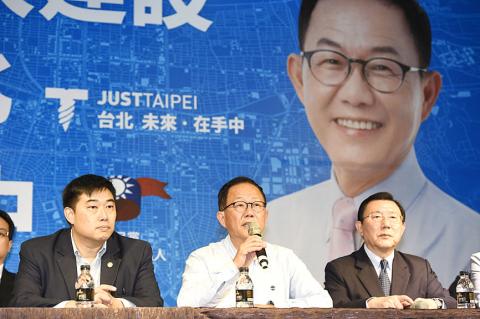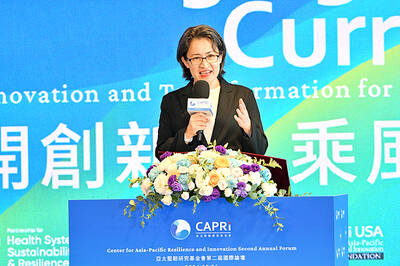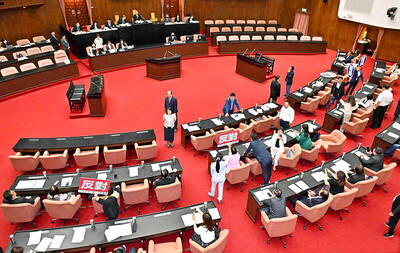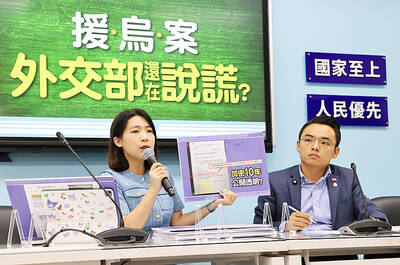The Chinese Nationalist Party’s (KMT) Ting Shou-chung (丁守中) yesterday filed an application with the Taipei District Court to have the ballots from Saturday’s Taipei mayoral election sealed and was expected to file a lawsuit to have the vote annulled after losing the mayoral race to Mayor Ko Wen-je (柯文哲).
The election was held alongside 10 referendums at 1,563 polling stations citywide from 8am to 7:46pm, but the ballot counting in the neck-and-neck race lasted for more than 10 hours until 2:35am yesterday.
In the five-way race, Ko garnered 580,820 votes, or 41.05 percent of the votes cast, against Ting’s 577,566 votes (40.82 percent).

Photo: George Tsorng, Taipei Times
Pasuya Yao (姚文智) of the Democratic Progressive Party (DPP) received 244,641 votes, or 17.29 percent.
Ting, who lost to Ko by 3,254 votes, arrived at the court with his lawyer at about 3:15am yesterday.
At about 6am, the court issued a ruling requiring him to pay a deposit of NT$4.3 million (US$139,150) within 24 hours.
According to the Civil Servants Election and Recall Act (公職人員選舉罷免法), the applicant must pay a deposit of NT$3 per vote for a recount, the court said, adding that 1,427,643 votes were cast in the Taipei mayoral election.
Ting’s application would be rejected if he does not make the deposit, it said.
Ting told reporters in front of the court that he believes there were major illegalities in the voting and counting process.
Taipei was the only city in this year’s elections where the “dump-save effect” could have occurred, he said, referring to strategic voting by the public to sacrifice one candidate for another in the event of a tight race between multiple — usually three — candidates.
Candidates were barred from releasing polls 10 days before the elections to prevent influencing voters and campaigning was not allowed on election day, he said.
Despite the measures, vote counting took place for three hours and 46 minutes as ballots were still being cast on Saturday, he said, adding that no other country in the world would allow this to happen.
Ting also questioned the counting process, which he said took more than nine hours and was paused several times.
New Taipei City has a bigger population than Taipei, but its counting process was faster, he said.
Ting said he suspects the Central Election Commission (CEC) and the Taipei City Election Commission conspired to bring forth the “dump-save effect” in the city, insinuating that pan-green camp voters “sacrificed” Yao to elect Ko, an independent.
It was a “dirty trick” played by the DPP, he added.
Ting said his next step would be to file a lawsuit to invalidate the election.
The CEC and Ko said they respect Ting’s decision.
If Ting emerges as victor in the recount, the court would return his deposit, but he would forfeit the money if he loses the recount, according to the act.
The act also requires that the local government cover the expenses of the recount.
Lawyer Lin Chih-chun (林智群) said that if the KMT claims that simultaneous voting and vote-counting would affect the results of the election, then it should file lawsuits to invalidate all of the elections in the cities and counties where that was the case.
Voting and counting also happened simultaneously in New Taipei City, Taichung and Kaohsiung, cities in which the KMT won, he said.
Ting’s legal team said that alleged illegalities in Taipei were enough to influence the results of the election, adding that the “dump-save effect” only happened in Taipei.
Additional reporting by Chung Hung-liang and CNA

INSPIRING: Taiwan has been a model in the Asia-Pacific region with its democratic transition, free and fair elections and open society, the vice president-elect said Taiwan can play a leadership role in the Asia-Pacific region, vice president-elect Hsiao Bi-khim (蕭美琴) told a forum in Taipei yesterday, highlighting the nation’s resilience in the face of geopolitical challenges. “Not only can Taiwan help, but Taiwan can lead ... not only can Taiwan play a leadership role, but Taiwan’s leadership is important to the world,” Hsiao told the annual forum hosted by the Center for Asia-Pacific Resilience and Innovation think tank. Hsiao thanked Taiwan’s international friends for their long-term support, citing the example of US President Joe Biden last month signing into law a bill to provide aid to Taiwan,

STATE OF THE NATION: The legislature should invite the president to deliver an address every year, the TPP said, adding that Lai should also have to answer legislators’ questions The Chinese Nationalist Party (KMT) yesterday proposed inviting president-elect William Lai (賴清德) to make a historic first state of the nation address at the legislature following his inauguration on May 20. Lai is expected to face many domestic and international challenges, and should clarify his intended policies with the public’s representatives, KMT caucus secretary-general Hung Meng-kai (洪孟楷) said when making the proposal at a meeting of the legislature’s Procedure Committee. The committee voted to add the item to the agenda for Friday, along with another similar proposal put forward by the Taiwan People’s Party (TPP). The invitation is in line with Article 15-2

Premier Chen Chien-jen (陳建仁) and the Ministry of Foreign Affairs yesterday denounced Chinese Nationalist Party (KMT) Legislator Hsu Chiao-hsin (徐巧芯) for making false allegations about donations to Ukraine and disclosing confidential documents, with the ministry saying that it would take legal action. The ministry last year signed an agreement with the Czech Republic on a healthcare project to assist Ukraine, which is to be carried out by the Czech Health Technology Institute. Hsu accused the ministry of being indirectly involved in the party politics of the Czech Republic as institute chairman Petr Foit is a local medical supplier, and has close political

‘DIGITAL SOLIDARITY’: Taiwan, the US, Japan, Australia and New Zealand are to install and operate a cable that would connect up to 100,000 people in the Pacific Islands Taiwan, the US, Japan, Australia and New Zealand are working together to install undersea cables as a demonstration of digital solidarity, US Secretary of State Antony Blinken said on Monday. Blinken talked about the cooperation in a speech he delivered at the RSA Conference in San Francisco. He said that the US International Cyberspace and Digital Strategy launched by the US Department of State “treats digital solidarity as our North Star.” “Solidarity informs our approach not only to digital technologies, but to all key foundational technologies,” Blinken said. Under the strategy, the US is to work with international partners “to shape the design, development,